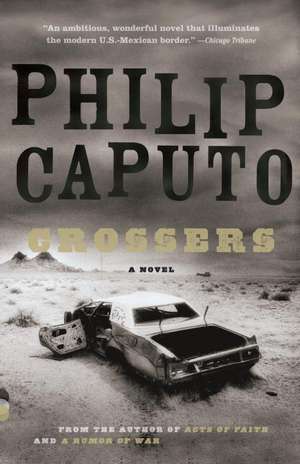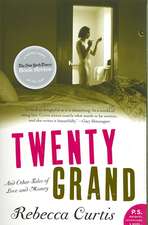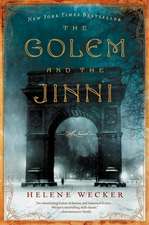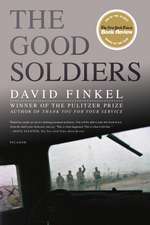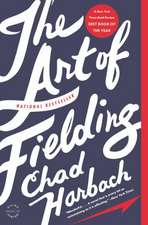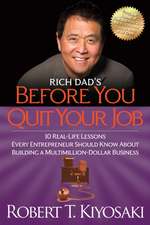Crossers: Vintage Contemporaries
Autor Philip Caputoen Limba Engleză Paperback – 30 sep 2010
Din seria Vintage Contemporaries
-
 Preț: 109.95 lei
Preț: 109.95 lei -
 Preț: 101.80 lei
Preț: 101.80 lei -
 Preț: 96.52 lei
Preț: 96.52 lei -
 Preț: 107.46 lei
Preț: 107.46 lei -
 Preț: 91.77 lei
Preț: 91.77 lei -
 Preț: 101.88 lei
Preț: 101.88 lei -
 Preț: 111.51 lei
Preț: 111.51 lei -
 Preț: 119.87 lei
Preț: 119.87 lei -
 Preț: 99.75 lei
Preț: 99.75 lei -
 Preț: 97.34 lei
Preț: 97.34 lei -
 Preț: 111.92 lei
Preț: 111.92 lei -
 Preț: 117.87 lei
Preț: 117.87 lei -
 Preț: 95.92 lei
Preț: 95.92 lei -
 Preț: 113.56 lei
Preț: 113.56 lei -
 Preț: 132.88 lei
Preț: 132.88 lei -
 Preț: 108.09 lei
Preț: 108.09 lei -
 Preț: 115.42 lei
Preț: 115.42 lei -
 Preț: 106.04 lei
Preț: 106.04 lei -
 Preț: 96.11 lei
Preț: 96.11 lei -
 Preț: 90.64 lei
Preț: 90.64 lei -
 Preț: 87.84 lei
Preț: 87.84 lei -
 Preț: 99.51 lei
Preț: 99.51 lei -
 Preț: 105.41 lei
Preț: 105.41 lei -
 Preț: 99.30 lei
Preț: 99.30 lei -
 Preț: 120.26 lei
Preț: 120.26 lei -
 Preț: 103.74 lei
Preț: 103.74 lei -
 Preț: 100.98 lei
Preț: 100.98 lei -
 Preț: 100.76 lei
Preț: 100.76 lei -
 Preț: 89.09 lei
Preț: 89.09 lei -
 Preț: 115.94 lei
Preț: 115.94 lei -
 Preț: 101.24 lei
Preț: 101.24 lei -
 Preț: 125.13 lei
Preț: 125.13 lei -
 Preț: 89.50 lei
Preț: 89.50 lei -
 Preț: 100.35 lei
Preț: 100.35 lei -
 Preț: 139.63 lei
Preț: 139.63 lei -
 Preț: 90.35 lei
Preț: 90.35 lei -
 Preț: 106.45 lei
Preț: 106.45 lei -
 Preț: 89.91 lei
Preț: 89.91 lei -
 Preț: 107.92 lei
Preț: 107.92 lei -
 Preț: 77.02 lei
Preț: 77.02 lei -
 Preț: 125.21 lei
Preț: 125.21 lei -
 Preț: 96.93 lei
Preț: 96.93 lei -
 Preț: 112.11 lei
Preț: 112.11 lei -
 Preț: 83.94 lei
Preț: 83.94 lei -
 Preț: 97.15 lei
Preț: 97.15 lei -
 Preț: 105.82 lei
Preț: 105.82 lei -
 Preț: 88.62 lei
Preț: 88.62 lei -
 Preț: 111.76 lei
Preț: 111.76 lei -
 Preț: 129.78 lei
Preț: 129.78 lei -
 Preț: 100.57 lei
Preț: 100.57 lei
Preț: 137.71 lei
Nou
Puncte Express: 207
Preț estimativ în valută:
26.35€ • 27.59$ • 21.80£
26.35€ • 27.59$ • 21.80£
Carte disponibilă
Livrare economică 15-29 martie
Preluare comenzi: 021 569.72.76
Specificații
ISBN-13: 9780375725982
ISBN-10: 0375725989
Pagini: 464
Dimensiuni: 134 x 201 x 26 mm
Greutate: 0.36 kg
Editura: Vintage Publishing
Seria Vintage Contemporaries
ISBN-10: 0375725989
Pagini: 464
Dimensiuni: 134 x 201 x 26 mm
Greutate: 0.36 kg
Editura: Vintage Publishing
Seria Vintage Contemporaries
Notă biografică
Philip Caputo worked for nine years for the Chicago Tribune and shared a Pulitzer Prize in 1972 for his reporting on election fraud in Chicago. He is the author of seven other works of fiction and two memoirs, including A Rumor of War, about his service in Vietnam, and four works of nonfiction. He divides his time between Connecticut and Arizona.
Extras
Ben Erskine
We fly from our time and place to the settlement of Lochiel, the present-day ghost town then home to four hundred souls: adobe houses and miners' shacks, a post office, a school, a few stores, and three saloons islanded on the mile-high grasslands of the San Rafael Valley and tethered to the outside world by a single road that writhes westward through the Patagonia Mountains to its end in Nogales, the road deeply rutted by the giant wagons trundling silver and copper ore out of the mountains to Lochiel's smelter, its stack leaking smoke into an otherwise unblemished desert sky.
The black tendril leans in a light breeze, and a faint, sooty mist sifts down on the tin roof of a nearby bungalow—the house-cum-courtroom of Joshua Pittman, the justice of the peace. A clean-shaven man of forty, wearing a collarless shirt and a vest he can no longer button over his portly torso, he is seated on a spindle-backed chair on his front porch, booted feet crossed atop the porch rail as he reads the Border Vidette. The issue is dated August 6, 1903; it's two days old, delivered from Nogales, some twenty miles away, by a mailman on horseback. The Justice, as he's often called, reads almost every word; as a leading citizen in a town most of whose inhabitants are illiterate in English and Spanish, he considers it his duty to keep abreast of events in the world beyond Lochiel.
In his dusty yard stands his nephew, Ben Erskine, a boy just past the threshold of adolescence, tall for his age, as lean as one of the ocotillo wands that fence the yard. He wears a loose-fitting cotton shirt, dungarees tucked into a pair of scruffy boots, and a high-peaked, dirty hat, its brim rolled up tightly at the sides. A boy on an idle Saturday, playing a solitary game of mumblety-peg in the shade of a cottonwood. The hunting knife in his hand is a prize possession, its four-inch blade mirror-bright and sharp enough to cleanly slice a page of his uncle's newspaper. What makes this knife special are the engravings on each side of the blade. At first glance they resemble scrollwork; but with a closer look, the pattern reveals itself to be a dancing girl in three different intertwined poses. Holding the knife up to the light at the correct angle and turning it slowly side to side creates an illusion of movement. The three figures merge into one; the dancing girl comes to life, her ample hips swaying. Ownership of the knife has made Ben the envy of the other boys at Lochiel's one-room school. Many was the afternoon after class when they gathered around him for a demonstration and a chance to gawk at the forbidden. These entertainments have continued into the summer vacation, but they will end soon. Next month, after a year in his uncle's care, Ben will rejoin his mother, stepfather, and older brother, Jeffrey, in Tucson, where he is to begin high school. This isn't something he's looking forward to, not because he dislikes school—he is in fact an eager student—but because he doesn't get along with his stepfather, a South?ern Pacific supervisor named Rudy Hollister.
Skinny legs spread, Ben flips the knife into the ground a few inches from his right foot, then stretches his legs farther and plants his foot next to the knife, buried up to the dancing girl's neck. He is almost doing the splits. He can't move another inch, so he pulls his legs together, withdraws the knife, and begins again.
The Justice folds the newspaper, swings his feet off the rail, and looks at his nephew. "One of these days you are going to stick that thing clear through your foot," he says slowly and deliberately, as if he's passing sentence in his courtroom.
"Yes, sir."
"What do you mean? Yes, you are going to stick yourself in the foot?"
Ben pauses a moment, tips his hat back with two fingers as he's seen the cowhands do, and grins his peculiar grin. It slashes across his face like a soldier's hash mark and is often misinterpreted by those who don't know him well. To them, it looks like a sneer, cocky, even a little cruel.
"I did not mean that at all," he says. "I'm too accurate with it to stick myself."
"Right glad you are so confident," Joshua says, arching his sandy brown eyebrows. He squints at the sun, which is swinging from east to southeast over the far blue ranges of Sonora. "Your uncle's favorite refreshment needs replenishment. Seeing as how you have got so much free time, take a ride over to Esteban's for me."
Esteban's is a cantina in Santa Cruz, a small pueblo some six or seven miles over the border. In Joshua's estimation, the tequila sold there is superior to the brands peddled in Lochiel's saloons—raw smuggled hooch suitable for the uneducated palates of cowboys and miners, but not for a discriminating man such as himself.
"I'll saddle Maggie right away," Ben replies. Any chance to ride his pinto mare is welcome.
He collects the money from his uncle and starts toward the livery stables. Joshua watches him walk away, the shirt billowing as if it were hanging from a coat hanger, empty of flesh and bone. He's grown close to Ben in the past year, closer than he wanted to, and tries not to think about the boy's departure. He'd become accustomed to loneliness. When Ben came to live with him, nine years had passed since he buried Gabriela and the infant son who'd died with her, strangled by the umbilical cord, hanged by the organ that had sustained him in the womb.
That was in Nogales, where Joshua had been serving as post-master. After the funeral he returned home and opened the door, and the silence inside seemed to lunge at him as if alive. He walked out, abandoning everything he and Gabriela had owned, and never went back. No, the silence in this house will not be half so dreadful when Ben leaves for Tucson, but it will take some getting used to.
Hattie had written him last summer: "There's nothing we can do with him, and this is the last straw." For some petty slight, Ben had declared that he was going to whip his stepfather, who greeted the threat with a laugh. So she said, and Joshua had no reason to doubt his sister. Rudy Hollister was good-natured and was besides six feet two inches tall, with the arms and shoulders of the section hand he'd been before the railroad promoted him to supervisor. When Ben rushed him, he placed a hand on the boy's forehead and allowed him to flail the air until he could no longer keep his arms up. As reported by Hattie, Hollister said, "Don't look like you're ready to lick me just yet," and that should have been the end of it. But the humiliation had been too much for Ben. He seized a poker from the fireplace and threw it at his stepfather—"like a red Indian would throw a lance."
Ben's missile struck wide of its mark, but it raised Rudy's ire. "Tanned his hide but good," Hattie's letter went on. "First and only time Rudy laid a hand on either one of the boys. The only reason I can figure Ben hates him like he does is for not being his father, like he thinks Tom's death was Rudy's fault."
That did not surprise the Justice. Ben had worshiped his father, though he was often away from home, as a U.S. Customs officer patrolling the border, then as a territorial ranger, chasing outlaws and rustlers. Maybe Ben worshiped him because he was gone so much. The irony was that Tom Erskine, who'd survived gunfire from Mexican smugglers and white desperadoes, died as the result of a kick from a rank horse. Ruptured his liver.
Six months later Hattie married Rudy and moved to Tucson. Said she needed a man in the house to help her raise two rambunctious boys. Still, her swift remarriage caused a scandal in Lochiel. Might have had the decency to at least wait a year, the town gossips whispered. The rumor was that good-looking, fun-loving Hattie needed a man for other purposes. There was something, well, carnal about her; during Tom's absences, a hunger plain to every man in town would come into her eyes. She often went on solitary rides—the woman could ride like an Apache brave—spurring her horse into reckless gallops to blow off sexual steam.
Having described "the last straw," she listed Ben's previous offenses. Got into a gang fight and knocked a Mexican kid cold with a chunk of railroad spike hurled from his slingshot, and then, fearing he'd killed the kid, saddled his horse and fled into the mountains for three days, worrying her sick. With her case built (and pretty skillfully, thought the man of the law), she came to the point: would Joshua take Ben in for the next year? A big thing to ask of him, but she was at her wit's end, and Ben looked up to his uncle, the former cavalryman who had fought Geronimo.
Joshua smiled at the flattery. It wasn't as if he and Geronimo had met in a single combat. He had been in only a couple of brief skirmishes during the final campaign against the Apaches in '86. His memories consisted mostly of heat, dust, and burning eyes on endless, monotonous rides, pursuing a phantom across the desert and through the Dragoons and the Chiricahuas, until, with his people starved and exhausted, the phantom called it quits in a place called Skeleton Canyon. No, it wasn't flattery that convinced him to agree to Hattie's request. Rudy Hollister was only half of Ben's argument; the other half, he suspected, was Hattie herself. No great shakes as a mother, Joshua had reluctantly concluded. When Ben and Jeff were toddlers, she often left them alone in the house for hours, strapping them into high chairs so they wouldn't get into mischief while she visited with her friends or went shopping or took one of her rides. In matters of discipline she was inconsistent, indulgent one day, and the next . . . Well, there was that time when Ben was eight and engaged in some sort of obstreperous behavior. Hattie punished him by forcing him to walk barefoot over a trail cobbled with shale and junk rock chipped like half-finished spear points. He stubbed his toes, his feet bled, and he cried to her to pick him up, but she continued the torture until, in her reckoning, he'd learned his lesson.
Joshua figured he could do better, and the past year has proved him right. Not a lick of trouble, unless you count the time the schoolteacher caught Ben putting on a show with his unusual knife at recess. She wouldn't allow Ben to bring it to school from then on, and reprimanded Joshua for allowing his nephew to keep such an immoral object—and him the justice of the peace!
Ben is wearing the knife when he rides out of Lochiel, crossing into Mexico as easily as one might cross a street in Tucson or Phoenix. There is no barbed wire to impede him, no signpost except for a tall stone boundary marker to tell him that he is leaving the Arizona Territory. He's made this trip before but feels a small buzz nonetheless—it's an adventure for a thirteen-year-old to ride alone into another country on a fine horse like Maggie, small, lithe, and fast, a possession he prizes more than the knife hanging from his belt in a plain leather sheath.
He holds her to a lively walk, though he's tempted to strike a lope to cool his face. A tropical humidity burdens the air, for it is the monsoon season on the vast Sonoran Desert, the time of year that stockmen anticipate with hope and fear: if the rains succeed, their herds will prosper and so will they; if the rains fail, as they did in the nineties, the grass will wither, the calves birthed in spring will grow weak and fall prey to coyotes and cougars, and the cows gathered in the fall will go to market underweight. The owners of big spreads will survive; the small operators will be droughted out.
The rains have been abundant this year. The grasslands have gone from pale yellow to bright green, "green as Ireland," Ben heard an immigrant miner say. Fat cattle graze everywhere, and golden poppies speckle the roadside. Far to the southeast a compact storm sweeps the horizon, a moving black island in the sea of sky, the rain an opaque curtain hung from cloud to earth. To the southwest, more clouds, towering over the San Antonios, spread out in a black anvil that sparks lightning.
Ben rides alongside the Santa Cruz River for well over an hour, passing a campesino on a burro, then a range of low hills crowned with old mine tailings. Near the start of the river's westward bend, he enters the pueblo—small houses and stores flanking a fissured dirt street that leads into the plaza. It is siesta time. A couple of women in brilliant Indian garb are drawing water from the communal well; a man sits smoking on the bandstand steps; otherwise no one is out in the fierce midday heat. Esteban's, a flat-roofed adobe with the ends of its roof beams protruding from the front wall and CANTINA painted above its door, is a few doors down from the church, the grandest building in town, grander than the nearby courthouse.
Ben knots Maggie's reins to the hitching rail beside three other horses, one a big sorrel that must go seventeen hands. It is dim inside—a couple of windows admit patches of light in which dust motes swirl and sparkle. Three vaqueros sit drinking at crude tables against a wall, two together, the other by himself, tipping a beer bottle to his lips. All three look at Ben. He nods. The two seated together return the nod, but the third makes no movement, just squints at Ben as he crosses the dirt floor, worn as smooth as marble, gleaming in the places where the window light strikes it.
Esteban is in the back room. Ben hears clinks and clatters and surmises that he is stocking shelves. He stands at the bar. On the wall behind it planks supported by stout pegs hold dusty glasses, unlabeled bottles, and squat earthenware jugs. Ben waits a minute or two, feeling the solitary man's eyes on his back. The sensation makes him nervous, and he raps the bar loudly with his knuckles to gain Esteban's attention.
From the Hardcover edition.
We fly from our time and place to the settlement of Lochiel, the present-day ghost town then home to four hundred souls: adobe houses and miners' shacks, a post office, a school, a few stores, and three saloons islanded on the mile-high grasslands of the San Rafael Valley and tethered to the outside world by a single road that writhes westward through the Patagonia Mountains to its end in Nogales, the road deeply rutted by the giant wagons trundling silver and copper ore out of the mountains to Lochiel's smelter, its stack leaking smoke into an otherwise unblemished desert sky.
The black tendril leans in a light breeze, and a faint, sooty mist sifts down on the tin roof of a nearby bungalow—the house-cum-courtroom of Joshua Pittman, the justice of the peace. A clean-shaven man of forty, wearing a collarless shirt and a vest he can no longer button over his portly torso, he is seated on a spindle-backed chair on his front porch, booted feet crossed atop the porch rail as he reads the Border Vidette. The issue is dated August 6, 1903; it's two days old, delivered from Nogales, some twenty miles away, by a mailman on horseback. The Justice, as he's often called, reads almost every word; as a leading citizen in a town most of whose inhabitants are illiterate in English and Spanish, he considers it his duty to keep abreast of events in the world beyond Lochiel.
In his dusty yard stands his nephew, Ben Erskine, a boy just past the threshold of adolescence, tall for his age, as lean as one of the ocotillo wands that fence the yard. He wears a loose-fitting cotton shirt, dungarees tucked into a pair of scruffy boots, and a high-peaked, dirty hat, its brim rolled up tightly at the sides. A boy on an idle Saturday, playing a solitary game of mumblety-peg in the shade of a cottonwood. The hunting knife in his hand is a prize possession, its four-inch blade mirror-bright and sharp enough to cleanly slice a page of his uncle's newspaper. What makes this knife special are the engravings on each side of the blade. At first glance they resemble scrollwork; but with a closer look, the pattern reveals itself to be a dancing girl in three different intertwined poses. Holding the knife up to the light at the correct angle and turning it slowly side to side creates an illusion of movement. The three figures merge into one; the dancing girl comes to life, her ample hips swaying. Ownership of the knife has made Ben the envy of the other boys at Lochiel's one-room school. Many was the afternoon after class when they gathered around him for a demonstration and a chance to gawk at the forbidden. These entertainments have continued into the summer vacation, but they will end soon. Next month, after a year in his uncle's care, Ben will rejoin his mother, stepfather, and older brother, Jeffrey, in Tucson, where he is to begin high school. This isn't something he's looking forward to, not because he dislikes school—he is in fact an eager student—but because he doesn't get along with his stepfather, a South?ern Pacific supervisor named Rudy Hollister.
Skinny legs spread, Ben flips the knife into the ground a few inches from his right foot, then stretches his legs farther and plants his foot next to the knife, buried up to the dancing girl's neck. He is almost doing the splits. He can't move another inch, so he pulls his legs together, withdraws the knife, and begins again.
The Justice folds the newspaper, swings his feet off the rail, and looks at his nephew. "One of these days you are going to stick that thing clear through your foot," he says slowly and deliberately, as if he's passing sentence in his courtroom.
"Yes, sir."
"What do you mean? Yes, you are going to stick yourself in the foot?"
Ben pauses a moment, tips his hat back with two fingers as he's seen the cowhands do, and grins his peculiar grin. It slashes across his face like a soldier's hash mark and is often misinterpreted by those who don't know him well. To them, it looks like a sneer, cocky, even a little cruel.
"I did not mean that at all," he says. "I'm too accurate with it to stick myself."
"Right glad you are so confident," Joshua says, arching his sandy brown eyebrows. He squints at the sun, which is swinging from east to southeast over the far blue ranges of Sonora. "Your uncle's favorite refreshment needs replenishment. Seeing as how you have got so much free time, take a ride over to Esteban's for me."
Esteban's is a cantina in Santa Cruz, a small pueblo some six or seven miles over the border. In Joshua's estimation, the tequila sold there is superior to the brands peddled in Lochiel's saloons—raw smuggled hooch suitable for the uneducated palates of cowboys and miners, but not for a discriminating man such as himself.
"I'll saddle Maggie right away," Ben replies. Any chance to ride his pinto mare is welcome.
He collects the money from his uncle and starts toward the livery stables. Joshua watches him walk away, the shirt billowing as if it were hanging from a coat hanger, empty of flesh and bone. He's grown close to Ben in the past year, closer than he wanted to, and tries not to think about the boy's departure. He'd become accustomed to loneliness. When Ben came to live with him, nine years had passed since he buried Gabriela and the infant son who'd died with her, strangled by the umbilical cord, hanged by the organ that had sustained him in the womb.
That was in Nogales, where Joshua had been serving as post-master. After the funeral he returned home and opened the door, and the silence inside seemed to lunge at him as if alive. He walked out, abandoning everything he and Gabriela had owned, and never went back. No, the silence in this house will not be half so dreadful when Ben leaves for Tucson, but it will take some getting used to.
Hattie had written him last summer: "There's nothing we can do with him, and this is the last straw." For some petty slight, Ben had declared that he was going to whip his stepfather, who greeted the threat with a laugh. So she said, and Joshua had no reason to doubt his sister. Rudy Hollister was good-natured and was besides six feet two inches tall, with the arms and shoulders of the section hand he'd been before the railroad promoted him to supervisor. When Ben rushed him, he placed a hand on the boy's forehead and allowed him to flail the air until he could no longer keep his arms up. As reported by Hattie, Hollister said, "Don't look like you're ready to lick me just yet," and that should have been the end of it. But the humiliation had been too much for Ben. He seized a poker from the fireplace and threw it at his stepfather—"like a red Indian would throw a lance."
Ben's missile struck wide of its mark, but it raised Rudy's ire. "Tanned his hide but good," Hattie's letter went on. "First and only time Rudy laid a hand on either one of the boys. The only reason I can figure Ben hates him like he does is for not being his father, like he thinks Tom's death was Rudy's fault."
That did not surprise the Justice. Ben had worshiped his father, though he was often away from home, as a U.S. Customs officer patrolling the border, then as a territorial ranger, chasing outlaws and rustlers. Maybe Ben worshiped him because he was gone so much. The irony was that Tom Erskine, who'd survived gunfire from Mexican smugglers and white desperadoes, died as the result of a kick from a rank horse. Ruptured his liver.
Six months later Hattie married Rudy and moved to Tucson. Said she needed a man in the house to help her raise two rambunctious boys. Still, her swift remarriage caused a scandal in Lochiel. Might have had the decency to at least wait a year, the town gossips whispered. The rumor was that good-looking, fun-loving Hattie needed a man for other purposes. There was something, well, carnal about her; during Tom's absences, a hunger plain to every man in town would come into her eyes. She often went on solitary rides—the woman could ride like an Apache brave—spurring her horse into reckless gallops to blow off sexual steam.
Having described "the last straw," she listed Ben's previous offenses. Got into a gang fight and knocked a Mexican kid cold with a chunk of railroad spike hurled from his slingshot, and then, fearing he'd killed the kid, saddled his horse and fled into the mountains for three days, worrying her sick. With her case built (and pretty skillfully, thought the man of the law), she came to the point: would Joshua take Ben in for the next year? A big thing to ask of him, but she was at her wit's end, and Ben looked up to his uncle, the former cavalryman who had fought Geronimo.
Joshua smiled at the flattery. It wasn't as if he and Geronimo had met in a single combat. He had been in only a couple of brief skirmishes during the final campaign against the Apaches in '86. His memories consisted mostly of heat, dust, and burning eyes on endless, monotonous rides, pursuing a phantom across the desert and through the Dragoons and the Chiricahuas, until, with his people starved and exhausted, the phantom called it quits in a place called Skeleton Canyon. No, it wasn't flattery that convinced him to agree to Hattie's request. Rudy Hollister was only half of Ben's argument; the other half, he suspected, was Hattie herself. No great shakes as a mother, Joshua had reluctantly concluded. When Ben and Jeff were toddlers, she often left them alone in the house for hours, strapping them into high chairs so they wouldn't get into mischief while she visited with her friends or went shopping or took one of her rides. In matters of discipline she was inconsistent, indulgent one day, and the next . . . Well, there was that time when Ben was eight and engaged in some sort of obstreperous behavior. Hattie punished him by forcing him to walk barefoot over a trail cobbled with shale and junk rock chipped like half-finished spear points. He stubbed his toes, his feet bled, and he cried to her to pick him up, but she continued the torture until, in her reckoning, he'd learned his lesson.
Joshua figured he could do better, and the past year has proved him right. Not a lick of trouble, unless you count the time the schoolteacher caught Ben putting on a show with his unusual knife at recess. She wouldn't allow Ben to bring it to school from then on, and reprimanded Joshua for allowing his nephew to keep such an immoral object—and him the justice of the peace!
Ben is wearing the knife when he rides out of Lochiel, crossing into Mexico as easily as one might cross a street in Tucson or Phoenix. There is no barbed wire to impede him, no signpost except for a tall stone boundary marker to tell him that he is leaving the Arizona Territory. He's made this trip before but feels a small buzz nonetheless—it's an adventure for a thirteen-year-old to ride alone into another country on a fine horse like Maggie, small, lithe, and fast, a possession he prizes more than the knife hanging from his belt in a plain leather sheath.
He holds her to a lively walk, though he's tempted to strike a lope to cool his face. A tropical humidity burdens the air, for it is the monsoon season on the vast Sonoran Desert, the time of year that stockmen anticipate with hope and fear: if the rains succeed, their herds will prosper and so will they; if the rains fail, as they did in the nineties, the grass will wither, the calves birthed in spring will grow weak and fall prey to coyotes and cougars, and the cows gathered in the fall will go to market underweight. The owners of big spreads will survive; the small operators will be droughted out.
The rains have been abundant this year. The grasslands have gone from pale yellow to bright green, "green as Ireland," Ben heard an immigrant miner say. Fat cattle graze everywhere, and golden poppies speckle the roadside. Far to the southeast a compact storm sweeps the horizon, a moving black island in the sea of sky, the rain an opaque curtain hung from cloud to earth. To the southwest, more clouds, towering over the San Antonios, spread out in a black anvil that sparks lightning.
Ben rides alongside the Santa Cruz River for well over an hour, passing a campesino on a burro, then a range of low hills crowned with old mine tailings. Near the start of the river's westward bend, he enters the pueblo—small houses and stores flanking a fissured dirt street that leads into the plaza. It is siesta time. A couple of women in brilliant Indian garb are drawing water from the communal well; a man sits smoking on the bandstand steps; otherwise no one is out in the fierce midday heat. Esteban's, a flat-roofed adobe with the ends of its roof beams protruding from the front wall and CANTINA painted above its door, is a few doors down from the church, the grandest building in town, grander than the nearby courthouse.
Ben knots Maggie's reins to the hitching rail beside three other horses, one a big sorrel that must go seventeen hands. It is dim inside—a couple of windows admit patches of light in which dust motes swirl and sparkle. Three vaqueros sit drinking at crude tables against a wall, two together, the other by himself, tipping a beer bottle to his lips. All three look at Ben. He nods. The two seated together return the nod, but the third makes no movement, just squints at Ben as he crosses the dirt floor, worn as smooth as marble, gleaming in the places where the window light strikes it.
Esteban is in the back room. Ben hears clinks and clatters and surmises that he is stocking shelves. He stands at the bar. On the wall behind it planks supported by stout pegs hold dusty glasses, unlabeled bottles, and squat earthenware jugs. Ben waits a minute or two, feeling the solitary man's eyes on his back. The sensation makes him nervous, and he raps the bar loudly with his knuckles to gain Esteban's attention.
From the Hardcover edition.
Recenzii
“An ambitious, wonderful novel that illuminates the modern U.S.-Mexican border.” —Chicago Tribune
“Crossers is a novel of grief and recovery, a love story, a thriller, but it is most of all a novel about a place, one that can break your heart and make it soar.” —St. Petersburg Times
“A complex story, unfolding in varying viewpoints, all of them as rich and real as a home movie.” —The Dallas Morning News
“[A] remarkably ambitious book that packs a meaty, multi-generational story with enough scope, insight and realism to illuminate the modern U.S.—Mexican border. . . . Enthralling.” —The Washington Post Book Review
“Caputo gives us characters with credibility and individuality. . . . An intense, clear-sighted account of the times in which we live, of 9/11, the Iraq war, the ‘war on drugs’ and the conflict over illegal immigration. Caputo succeeds in showing how our contemporary paranoia and homeland insecurity are rooted in the inescapable past.” —San Francisco Chronicle
“A satisfying story, with memorable characters moving against a backdrop of beauty and brutality.” —The Boston Globe
“A historical story line involving the grandfather of Gil and Blaine, a legendary Old West lawman and killer . . . [is] so strong that it could be Mark Twain.” —Los Angeles Times
“Caputo tells Ben’s story with power and verisimilitude. . . . The reason I enjoyed Crossers as much as I did . . . is that it hints at how difficult it can be to draw conclusions—about evil, about Ben, and above all about the crossers themselves.” —William T. Vollmann, The New York Times Book Review
“Caputo . . . has long focused his fiction on the moral ambiguities that have accompanied violent conflicts around the world—Vietnam, the Sudan, Iraq. With Crossers, he brings the war home, powerfully evoking an America marked by complexities, contradictions and an uncomfortable relationship with its own past.” —BookPage
“Crossers takes us through generations of Arizona history with understanding, intelligence and beautiful language. . . . [Caputo’s] feet and eyes are upon these great lands, and from the beauty of his writing, it’s clear his heart is, too.” —Tucson Weekly
“[A] novel of reflection and adventure. . . . Caputo is a wonderful writer, and you come away from his stories the better for your time spent.” —The Decatur Daily
“Caputo writes with authority about all aspects of his story, including the drug and immigrant smuggling trades, what it was like for a soldier in the Mexican Revolution, how the Mexican-American border was once a fluid boundary, and the details of ranching in contemporary times and a hundred years ago. Crossers provides an accurate portrait of the violence, greed, and desperation that has cropped up around the border for generations. . . . A nuanced, panoramic portrait of lives lived and lost on the Mexican-American border.” —New West
“Crossers is a novel of grief and recovery, a love story, a thriller, but it is most of all a novel about a place, one that can break your heart and make it soar.” —St. Petersburg Times
“A complex story, unfolding in varying viewpoints, all of them as rich and real as a home movie.” —The Dallas Morning News
“[A] remarkably ambitious book that packs a meaty, multi-generational story with enough scope, insight and realism to illuminate the modern U.S.—Mexican border. . . . Enthralling.” —The Washington Post Book Review
“Caputo gives us characters with credibility and individuality. . . . An intense, clear-sighted account of the times in which we live, of 9/11, the Iraq war, the ‘war on drugs’ and the conflict over illegal immigration. Caputo succeeds in showing how our contemporary paranoia and homeland insecurity are rooted in the inescapable past.” —San Francisco Chronicle
“A satisfying story, with memorable characters moving against a backdrop of beauty and brutality.” —The Boston Globe
“A historical story line involving the grandfather of Gil and Blaine, a legendary Old West lawman and killer . . . [is] so strong that it could be Mark Twain.” —Los Angeles Times
“Caputo tells Ben’s story with power and verisimilitude. . . . The reason I enjoyed Crossers as much as I did . . . is that it hints at how difficult it can be to draw conclusions—about evil, about Ben, and above all about the crossers themselves.” —William T. Vollmann, The New York Times Book Review
“Caputo . . . has long focused his fiction on the moral ambiguities that have accompanied violent conflicts around the world—Vietnam, the Sudan, Iraq. With Crossers, he brings the war home, powerfully evoking an America marked by complexities, contradictions and an uncomfortable relationship with its own past.” —BookPage
“Crossers takes us through generations of Arizona history with understanding, intelligence and beautiful language. . . . [Caputo’s] feet and eyes are upon these great lands, and from the beauty of his writing, it’s clear his heart is, too.” —Tucson Weekly
“[A] novel of reflection and adventure. . . . Caputo is a wonderful writer, and you come away from his stories the better for your time spent.” —The Decatur Daily
“Caputo writes with authority about all aspects of his story, including the drug and immigrant smuggling trades, what it was like for a soldier in the Mexican Revolution, how the Mexican-American border was once a fluid boundary, and the details of ranching in contemporary times and a hundred years ago. Crossers provides an accurate portrait of the violence, greed, and desperation that has cropped up around the border for generations. . . . A nuanced, panoramic portrait of lives lived and lost on the Mexican-American border.” —New West
Descriere
From the acclaimed author of "Acts of Faith" comes a blistering new novel about the brutality and beauty of life on the Arizona-Mexico border, and about the unyielding power of the past to shape people's lives.
